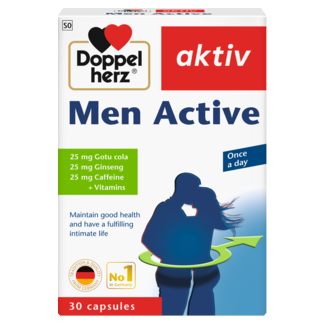Men’s health

Health products for men

Men - particular nutritional needs
The different requirements are also a result of the differing dietary preferences of men and women. Women eat in a more controlled and cautious way and tend to a healthier diet than men, who would rather simply eat what they like.
As a matter of fact, studies regarding men's health show that the stronger sex often does not care about health. Only 73 % of males include fruit and vegetable in their daily diet, while 65 % of them consume meat and meat products every day. Nearly 93 % of the women, on the other hand, eat fruit and vegetable daily, and only 35 % of them have meat and meat products on their plate daily.
Daily nutritional needs of men / women:
| Nutrient | Man | Woman |
|---|---|---|
| Magnesium | 350 mg | 300 mg |
| Zinc | 10 mg | 7 mg |
| Vitamin B1 | 1,2 mg | 1,0 mg |
| Vitamin B2 | 1,4 mg | 1,1 mg |
| Vitamin B6 | 1,5 mg | 1,2 mg |
Muscles need magnesium
Magnesium is vital – both for men and women. Without magnesium, many metabolic processes would work inadequately or not at all. This mineral contributes to the energy metabolism, stabilizes the skeleton and plays a significant role in the transmission of stimuli from nerves to muscles. And of course, it is indispensable for muscle contraction.
In case of a magnesium deficiency, the muscles may contract spontaneously and spasmodically without being able to relax. A muscle cramp is the result. One of the most common manifestations of magnesium deficiency is night-time cramps in the lower leg.
Genetically, men have more muscle mass than women, and thus an increased magnesium requirement. Also, men lose more magnesium as a result of more and quicker perspiration.
Anyone crazy about sports should pay particular heed to adequate magnesium supply. Physical strain can make the body cross the anaerobic threshold and thus go out of its oxygen balance. If the body has a deficit of oxygen, it produces lactate in the muscle cells, which has an influence on the person's resilience. Magnesium again is needed to remove the lactate from the body.
Selenium – for sperm production
Selenium is required for numerous processes in the human metabolism. It is known to most as a useful helper for cell health and to support the immune system.
For the stronger sex, it has a further significance as it is involved in sperm production and thus male fertility.
Sperm production decreases principally with progressing age. Men should, therefore, choose a diet that is rich in selenium in order to support their normal sperm production.
Selenium is found mainly in meat, fish and eggs, but also in lentils and asparagus. German soils are generally classified as low-selenium, so plant-based foods contribute to the supply of selenium only slightly. Also, the heavy application of fertilizers in agriculturally used soils can prevent the intake of selenium in plants.
Zinc is a component of testosterone
Zinc plays an important part for men as it is a component of the male sexual hormone, testosterone. Men desiring to have children should support their hormonal balance with adequate zinc because zinc contributes to maintaining a normal testosterone level and thus normal fertility.
In addition, testosterone influences the development of muscular tissue and builds muscle. The higher level of testosterone in men is thus responsible for growing bigger and wider muscles than women.
Men should, therefore, design their diet so that there is an adequate supply of the trace element zinc. Men are recommended to take in 15 mg of zinc daily,
women 12 mg. Good sources of zinc are meat, milk, grain products and sunflower seeds. The processing and preparation of food, however, can result in considerable losses of nutrients.